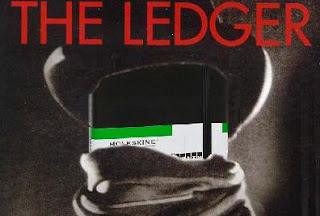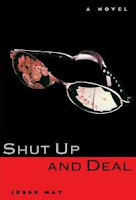The Ledger
 “Everybody’s got their own ideas about keeping a ledger, but one thing’s in common -- they’re personal.”
“Everybody’s got their own ideas about keeping a ledger, but one thing’s in common -- they’re personal.”So says Mickey Dane in Jesse May’s 1998 poker-themed novel Shut Up and Deal. The line comes at the beginning of one of many passages in the book that remind us Mickey is an existentialist. He makes his own meaning or “order” of his existence, with the narrative itself perhaps representing an effort to do just that.
As he says early on when introducing his story, “there is no reality, it all depends on how I present what is and how I cloud it.” We know from the start this full-time poker player doing whatever he can to stay in action in mid-1990s Atlantic City (and elsewhere) is sharing an entirely subjective view of his experiences. He freely admits throughout that his judgment about what is “real” and what isn’t might occasionally be suspect.
Indeed, near the end Mickey wonders aloud whether or not all of the mind games he plays with himself -- symbolized by the frequent changing of clothes during one long last losing streak -- might add up to him trying to trick himself into believing something about his existence. “Either in poker everything is very illusory, or I’m pulling one giant hoax on myself,” he admits.
The ledger to which Mickey is referring is a literal one, the place where some of us who play poker write down how we’re doing. Like the narrative or other efforts by Mickey to “put some order” into his existence, the ledger is likewise a means to make sense of it all. But Mickey is as cynical about ledger-keeping as about any effort to make things add up (so to speak).
 “People keep it to try to prove to themselves that they should keep playing, that they’re ahead,” explains Mickey. “Keep it under their pillow to consult like a Bible on those dark and stormy nights. Like anything on paper is gonna make sense of the chaos of the gambling world....”
“People keep it to try to prove to themselves that they should keep playing, that they’re ahead,” explains Mickey. “Keep it under their pillow to consult like a Bible on those dark and stormy nights. Like anything on paper is gonna make sense of the chaos of the gambling world....”I’ve always kept such a ledger. I’ve written here before about how I believe doing so helped me tremendously early on, becoming an important part of the process by which I was able to start winning at poker -- “to prove to myself that I should keep playing,” to paraphrase Mickey.
After a while the keeping of the ledger -- in a black, Bible-looking Moleskine book, actually -- became less meaningful to me, a habit I’d begun and continued well beyond the point of it mattering that much to my abilities as a player, or even my idea of myself as a player.
When Mickey says the ledger is “personal,” he isn’t necessarily talking about it being something that should be hidden away like a diary or anything else private. He means that even if someone else were to look at the ledger, it wouldn’t possess the same meaning that it does to the person keeping it. The numbers I’ve written down over the years in my little black book couldn’t possibly mean the same thing to someone else that they do to me. Nor would I be able to look at the figures listed in your ledger -- if you happen to keep one -- and guess what exactly they meant to you.
Like I say, I still keep entering numbers, although they’re no longer anywhere close to as consequential as they once were for me. Really the whole idea of the ledger has faded in importance over the last year since Black Friday.
But still I keep on with it. Why? I can’t explain, really. It’s personal.
Labels: *by the book, Jesse May, record-keeping, Shut Up and Deal














0 Comments:
Post a Comment
<< Home